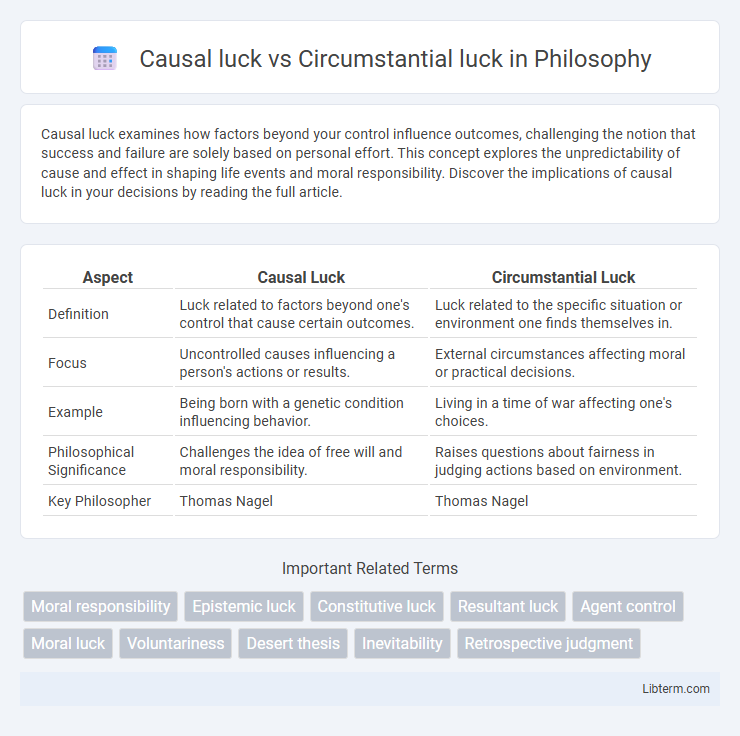Causal luck examines how factors beyond your control influence outcomes, challenging the notion that success and failure are solely based on personal effort. This concept explores the unpredictability of cause and effect in shaping life events and moral responsibility. Discover the implications of causal luck in your decisions by reading the full article.
Table of Comparison
| Aspect | Causal Luck | Circumstantial Luck |
|---|---|---|
| Definition | Luck related to factors beyond one's control that cause certain outcomes. | Luck related to the specific situation or environment one finds themselves in. |
| Focus | Uncontrolled causes influencing a person's actions or results. | External circumstances affecting moral or practical decisions. |
| Example | Being born with a genetic condition influencing behavior. | Living in a time of war affecting one's choices. |
| Philosophical Significance | Challenges the idea of free will and moral responsibility. | Raises questions about fairness in judging actions based on environment. |
| Key Philosopher | Thomas Nagel | Thomas Nagel |
Defining Causal Luck and Circumstantial Luck
Causal luck refers to outcomes influenced by prior events beyond an individual's control, where the chain of causes determines the result. Circumstantial luck involves the specific conditions or situations a person encounters, impacting their opportunities or challenges. Both types of luck highlight different aspects of unpredictability shaping human experiences and decisions.
Key Differences Between Causal and Circumstantial Luck
Causal luck refers to outcomes influenced by factors directly linked to an individual's actions, while circumstantial luck involves external conditions beyond one's control affecting the outcome. Key differences include that causal luck hinges on the causes related to personal decisions or behaviors, whereas circumstantial luck depends on situational variables like timing or environment. Understanding these distinctions is crucial in philosophy and ethics for attributing responsibility and moral judgment.
Historical Perspectives on Luck in Philosophy
Causal luck refers to the influence of factors beyond an individual's control that shape outcomes, while circumstantial luck involves the specific situations an individual encounters. Philosophers like Aristotle emphasized the role of fortune (tyche) in human affairs, linking luck to divine intervention and fate, whereas modern thinkers such as Thomas Nagel and Bernard Williams analyzed luck in the context of moral responsibility and control. Historical perspectives reveal a shift from viewing luck as predetermined by external forces to recognizing its impact on ethical judgments and human agency.
Causal Luck: Origins and Examples
Causal luck refers to the unplanned events or prior causes that influence outcomes beyond an individual's control, shaped by complex chains of cause and effect in one's environment. Examples include inheriting a genetic condition or being involved in an unavoidable accident, where the circumstances stem from prior, unrelated causes. Unlike circumstantial luck, which depends on current situational factors, causal luck is deeply rooted in past events that set the stage for present outcomes.
Circumstantial Luck: Everyday Scenarios
Circumstantial luck arises from specific situations or external conditions that influence outcomes, such as being in the right place during an unexpected event or receiving help during a crisis. In everyday scenarios, this type of luck manifests when unpredictable factors like weather, traffic, or social encounters significantly affect decisions and results. Understanding circumstantial luck highlights how much external environment shapes personal success and setbacks beyond individual control.
The Role of Luck in Moral Responsibility
Causal luck refers to the influence of factors beyond an individual's control that causally affect their actions, while circumstantial luck involves the specific situations or contexts a person encounters. Both types of luck challenge traditional notions of moral responsibility by questioning the extent to which individuals can be held accountable for actions shaped by external conditions. Philosophers like Thomas Nagel and Bernard Williams emphasize that recognizing causal and circumstantial luck complicates judgments of praise and blame, as moral responsibility is often intertwined with uncontrollable elements.
Luck, Ethics, and Free Will
Causal luck pertains to factors beyond an individual's control that causally influence outcomes, challenging notions of moral responsibility by linking actions to prior events rather than free will alone. Circumstantial luck involves the specific situations in which individuals find themselves, affecting ethical judgments about accountability when outcomes depend heavily on external circumstances. Both types of luck raise critical questions about the interplay between luck, ethics, and free will, emphasizing how unchosen factors complicate assessments of moral praise or blame.
Philosophical Debates: Can Luck Be Controlled?
Causal luck refers to outcomes determined by factors beyond an individual's control but linked through cause-effect relationships, whereas circumstantial luck involves the specific environment or conditions one encounters. Philosophical debates center on whether individuals can exert control over these forms of luck, questioning the extent to which moral responsibility hinges on uncontrollable external factors. The discussion explores if humans can mitigate the impact of luck through deliberate actions or if luck remains an inescapable component shaping life's trajectory.
Real-World Implications of Luck Distinctions
Causal luck refers to outcomes influenced by factors beyond one's control but directly linked to one's actions, while circumstantial luck involves being placed in situations that affect outcomes without direct causation by personal choices. Understanding this distinction impacts real-world judgments of moral responsibility and fairness, especially in legal and ethical contexts where attributing blame or praise depends on the nature of luck involved. Policymaking and social evaluations often need to consider whether individuals' successes or failures result from causal or circumstantial luck to ensure equitable treatment and accountability.
Conclusions: Navigating Life’s Uncertainties
Causal luck stems from factors beyond one's control shaping outcomes, while circumstantial luck involves situations that create opportunities or obstacles. Understanding these distinctions allows individuals to better navigate life's uncertainties by recognizing external influences on success and failure. Emphasizing adaptability and resilience helps mitigate the effects of both types of luck in decision-making and personal growth.
Causal luck Infographic

 libterm.com
libterm.com